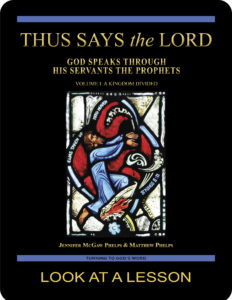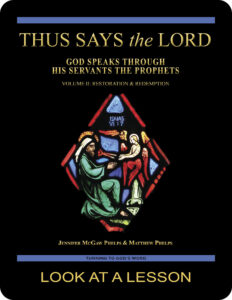a still, small voice
 The nineteenth chapter of the First Book of the Kings (NABRE) contains the fantastic reading that describes Elijah’s encounter with God on Mount Horeb. Prior to God passing by the prophet, a number of loud and violent natural disasters occur, but Elijah knows God is not present in those events. Then in a tiny whispering sound Elijah finds and acknowledges the presence of God.
The nineteenth chapter of the First Book of the Kings (NABRE) contains the fantastic reading that describes Elijah’s encounter with God on Mount Horeb. Prior to God passing by the prophet, a number of loud and violent natural disasters occur, but Elijah knows God is not present in those events. Then in a tiny whispering sound Elijah finds and acknowledges the presence of God.
This phrase used to describe God’s presence has also been translated as a “still small voice” and is deeply significant for what it tells us about God. The Hebrew text uses three words here. The first can refer to calm or a whisper, the second describes something small or thin, and the third refers to a voice—which suggest the sound is of human or animal origin. Each of these words creates contrast with the proceeding events. Calm and quite contrast the violence of the natural disasters, smallness is in contrast to their large scale, and the voice coming from a living thing contrasts with being merely an act of nature. All three of these contrasts are significant in showing how God’s behavior and God himself run contrary to what we might expect.
How and where do you expect to meet God in your life? Where might you be missing his voice because it’s not taking the form you expect?
you also may like our two-part study of the prophets

 Thus Says the LORD: God Speaks Through His Servants the Prophets—Volume I: A Kingdom Divided examines the prophets in their historical context using the First and Second Books of the Kings and other Old Testament passages written before the Babylonian Exile in 586 B.C. Volume II: Restoration & Redemption looks at the post-exilic prophets. This 51-lesson Catholic Bible study builds on The United Kingdom of Israel: Saul, David & Solomon Foreshadow Christ the King. Click on the books’ covers to view a sample lesson from each volume.
Thus Says the LORD: God Speaks Through His Servants the Prophets—Volume I: A Kingdom Divided examines the prophets in their historical context using the First and Second Books of the Kings and other Old Testament passages written before the Babylonian Exile in 586 B.C. Volume II: Restoration & Redemption looks at the post-exilic prophets. This 51-lesson Catholic Bible study builds on The United Kingdom of Israel: Saul, David & Solomon Foreshadow Christ the King. Click on the books’ covers to view a sample lesson from each volume.
 Click on the picture of the statue of Moses with horns (above) to learn more about Lost in Translation. A new entry is archived each Monday. Contact us to receive Lost in Translation by email every week. You may use any of the contact links on our website to ask Matthew a question.
Click on the picture of the statue of Moses with horns (above) to learn more about Lost in Translation. A new entry is archived each Monday. Contact us to receive Lost in Translation by email every week. You may use any of the contact links on our website to ask Matthew a question.
